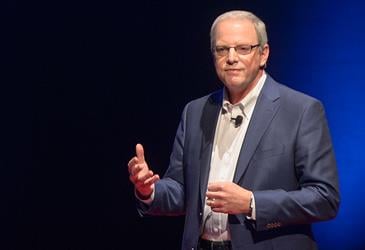Technology may empower patients with more information, but new websites or gadgetry will never replace the intuition of a good physician, according to Bob Wachter, MD, author of New York Times science bestseller The Digital Doctor. He recently shared his comments as part of a special preview event for TEDMED 2015. Here’s why he says experienced physicians—even in an era of tech-savvy patients and health IT—are still modern medicine’s most valuable commodity.
Physician intuition in the digital age
Just as generations of physicians before him, Dr. Wachter listens attentively to his patients’ grievances and uses notes about their symptoms to help guide an informed diagnosis.
Patients’ complaints often will help him crack the code on an elusive diagnosis, he said, but sometimes, especially when treating patients with complex conditions, he has to consult another source of information.
When confronted with challenging questions, “I came to realize that I was using what we physicians call the ‘eyeball test’ or that funny sense of intuition and experience,” Dr. Wachter said. “In some ways, it’s that ‘Spidey’ sense that tickles a part of the physicians’ cerebral cortex that says, ‘I wonder if this could be,’ and it makes [him] think a little harder.”
While this intuition has helped physicians successfully treat patients for years, modern technology, data and online articles are now causing patients to not trust physicians’ intuitive decisions. In fact, Dr. Wachter noted, “sometimes it even seems like patients and doctors are on different teams.”
“But I’m here to argue that I believe medicine is fundamentally different [than other industries], and patients will always need physicians,” Dr. Wachter said. “This idea of patients becoming their own doctors is actually a little dangerous.”
The human art of diagnosis
Dr. Wachter said he especially fears patients’ overreliance on technology for two critical reasons: Patients are over-diagnosing and misdiagnosing themselves.
Certain information patients find online may cause them to believe their symptoms are benign and overlook urgent medical conditions an experienced physician would catch if the patient were to see them.
“As an internist and hospitalist, when I see a sick patient, I’m collecting sometimes 100-200 pieces of data—everything from a patient’s chief complaint to their blood pressure to their temperature, travel and tone of their voice. And taking those 200 facts and distilling them into five salient points I’m trying to solve turns out to be a massively complicated act of cognition—and one that computers cannot replicate.”
Dr. Wachter said claims that computers and advanced algorithms will one day morph into diagnostic generators are more fodder for futuristic fable than imminent reality.
“Can computers ever get smart enough to take over the role of doctors as diagnosticians? Maybe,” Dr. Wachter said. “But they aren’t there today, and I don’t believe they will be there in the next several years. When will they get there? I suspect they will get there when they’re also able to write award-winning poetry, skate at the Olympics and become the CEOs of Fortune 500 companies. In other words, I think we have quite a while before we get there.”




